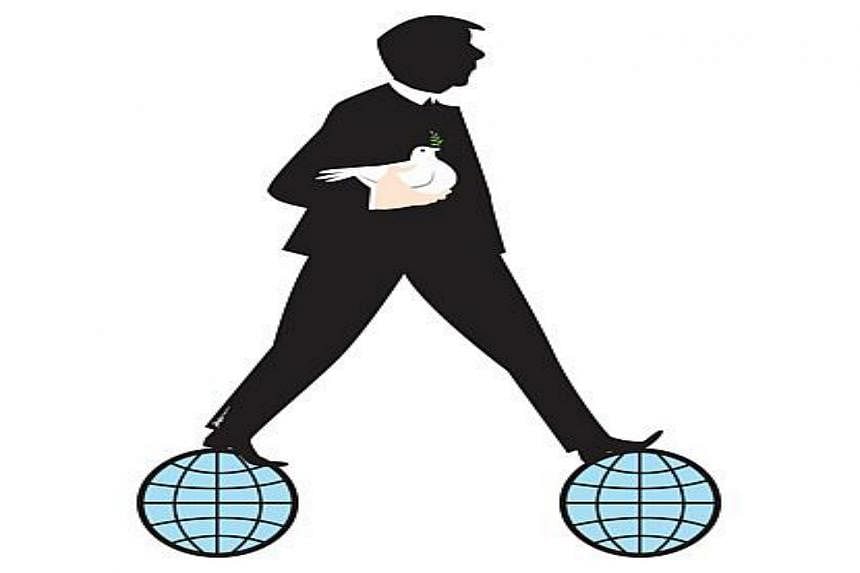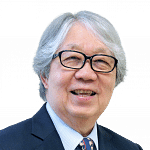In my long diplomatic career I have been appointed as a special envoy on three occasions: once by the United Nations secretary-general, Dr Boutros Boutros-Ghali, and twice by the second prime minister of Singapore, Mr Goh Chok Tong.
In 1993, Dr Boutros-Ghali appointed me as his Special Envoy to carry out his responsibility under a resolution adopted by the UN General Assembly.
The resolution had requested him to use his good offices to bridge the gap in the negotiations between the Russian Federation, on the one hand, and Estonia, Latvia and Lithuania, on the other hand.
The Cold War ended in 1990 when the Soviet Union was dissolved. When this happened, the Warsaw Pact lost its rationale and was also dissolved. Countries which had been incorporated, against their will, into the Soviet Union, broke free and became independent.
With the dissolution of the Warsaw Pact, countries which hosted Russian troops on their soil demanded their withdrawal. Millions of Russian troops and their families were stationed all over Eastern Europe. Bringing them back to Russia was a huge responsibility because of the shortage of housing and employment opportunities.
Problem in the Baltic
FRUSTRATED with the slow pace of negotiations, the three Baltic countries brought their complaints to the UN General Assembly. This led to the adoption of the resolution by the General Assembly.
The UN secretary-general decided to delegate his responsibility to me as his special envoy. There were three items on my agenda: (1) to propose a time- table for the withdrawal of the Russian troops; (2) to propose a time-table for the closure of the Russian bases and facilities in Estonia and Latvia; and (3) to plead with Estonia and Latvia for the humane treatment of the elderly Russian military pensioners and their families in those countries.
When Dr Boutros-Ghali offered me the appointment, I told him that I was not qualified because I had not been to any of the four countries. His reply was that was good because I had no baggage from the past and had an open mind.
When my appointment was announced, some Singaporeans had mistaken the Baltics for the Balkans and had expressed concern to my wife for my safety.
I will never forget my visits to Russia, Lithuania, Latvia and Estonia and the discussions I had with their leaders in September 1993. President Algirdas Brazauskas of Lithuania was kind and had a sense of humour. He told me that the day before my arrival, he had telephoned Russian President Boris Yeltsin and told him that the UN man was coming the next day and appealed to Mr Yeltsin to agree to pull out all the remaining Russian troops from his country on the day of my arrival. Mr Yeltsin had agreed.
I also remember the wise President of Estonia Lennart Meri. He told me the following story. During the Soviet era, Mr Meri was a journalist based in Moscow. On one occasion there was a state visit by a Soviet leader to Myanmar. The foreign ministry asked the writers' union whether any journalist would be willing to join the delegation. As no one was interested, Mr Meri volunteered. When the delegation arrived at the airport in Yangon, they were introduced one by one to the chief of protocol.
When it came to his turn, Mr Meri whispered something into the ear of the Myanmar official. Whereupon, the chief of protocol shouted some command in the local language and two armed escorts took Mr Meri away.
The leader of the Soviet delegation thought Mr Meri had defected and protested loudly. What had actually happened was that Mr Meri had told the official that he was from Estonia and he would like to be taken the Shwedagon Pagoda to pay his respects to Estonians who had become Buddhist priests.
I have another lovely story from my visit to Latvia. I met a delegation of Russian military pensioners in the capital, Riga. I promised them I would plead the case with the government and Parliament of Latvia. At the end of the meeting, the leader of the delegation, an impressive-looking Russian general, told me that if he were not an atheist he would ask God to bless me.
My mission was successful because the circumstances were favourable. In 1993, the Russian economy was extremely weak. President Yeltsin needed the help of the West. He was physically infirm and was politically not anti-West. In fact, Russia's ambition at that time was to be accepted by the West. Under these circumstances, President Yeltsin was prepared to withdraw his troops from the Baltic states and to allow them to determine their own destinies.
Looking back, I am grateful that I was able to play a small but positive role in the relations between Russia and its three Baltic neighbours. Today, Estonia, Latvia and Lithuania are doing well and feel secure as members of Nato and the European Union. However, there are several unresolved issues regarding relations with ethnic Russian minorities.
PM Goh's special envoy
IN 1999, Prime Minister Goh Chok Tong appointed me as his Special Envoy to the Kingdom of Bhutan. I was one of several special envoys sent to various countries to lobby for support for Singapore's candidature for election to one of the non-permanent seats of the UN Security Council. The election was to take place in the following year.
During my 13 years at the UN, in New York, I had become a close friend of many Bhutanese diplomats. There was an affinity between the diplomats of our two countries because we represented two small countries. I admired Bhutan because it had resisted pressure from New Delhi to support Vietnam in the Cambodian conflict. Bhutan supported Asean's position instead.
My visit to Bhutan in August 1999 was truly memorable. The scenery was breathtaking, with high mountains, deep valleys and lovely rivers. The environment was pristine. Bhutanese men and women were good looking, all dressed in their national costumes. There were no beggars and no touts.
I was received with great courtesy. I called on the prime minister and the foreign minister. I was invited to an informal dinner with members of the Cabinet. The highlight of my visit was my call on His Majesty the King, father of the current King, who was handsome, well-informed and humble. My companion Raziff Aljunied was surprised when the King gave me a warm embrace instead of a hand shake. The King told us how much he admired Singapore and pledged his support for our candidature.
Singapore's bid for the UN seat subsequently met with success.
In 2000, PM Goh again appointed me as his Special Envoy to see Myanmar's Senior General Than Shwe on a delicate matter. When I arrived at the airport in Yangon, I was received by the chief of protocol and ushered into an old government car which would take us to see the general. Halfway to the destination, the car broke down. I wondered if that was a bad omen for my mission!
Fortunately, the ambassador's car from the Singapore Embassy, which had been following us, came to our rescue and we finished the journey in the Singapore Embassy car. After waiting for a few minutes, I was taken to see Senior General Than Shwe.
The meeting got off to a good start because the general dispensed with the interpreter and spoke to me in English. He said that he had read my article, "Seven Days in Myanmar", which had been published in The Sunday Times. He said he was glad to read that my older son and I had enjoyed our visit to Myanmar. He invited us to visit Myanmar again as his personal guests.
I thanked him for his kindness. Taking advantage of the good atmosphere and his goodwill, I gently conveyed PM Goh's request. He immediately said yes. I repeated the request in order to make sure that he understood. He said yes again. I thanked him, shook his hand and took my leave. In the evening, I asked our Ambassador in Yangon, Mr Simon de Cruz, to take me to visit the Shwedagon Pagoda, to reflect on my good luck and the success of my mission.
Personal representative
IN DIPLOMATIC practice, a special envoy is different from an ambassador because he is given a specific assignment. He is also a personal representative of the nation's president or prime minister and therefore is normally accorded access to the highest leaders of the receiving country.
A special envoy's job could be that of a mere messenger or a mediator or conciliator. I played the role of a conciliator and mediator on my mission to Russia and the Baltics. In Bhutan and Myanmar, I was merely a messenger.
Governments should consider using such special envoys more often in order to mediate in difficult situations and disputes that arise in many parts of the world.
The writer is an ambassador-at-large at the Ministry of Foreign Affairs and a senior fellow of the MFA Diplomatic Academy.


